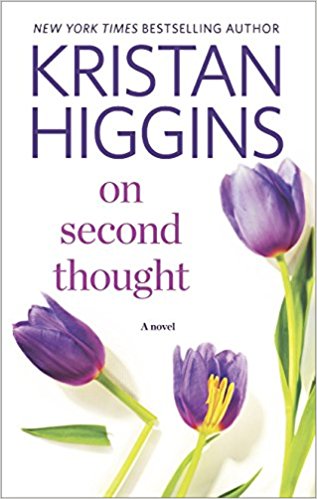 On Second Thought is the first of Higgins’ non-romance* books that I’ve read. And I’m happy to report I loved it. There is romance in the book—two, in fact—but the main storyline is two grown sisters getting close to each other for the first time.
On Second Thought is the first of Higgins’ non-romance* books that I’ve read. And I’m happy to report I loved it. There is romance in the book—two, in fact—but the main storyline is two grown sisters getting close to each other for the first time.
Kate O’Leary is a 39-year-old successful photographer when she meets Nathan. They’re married in a few months and trying to start a family. When Nathan is killed just 96 days into their marriage in a freak accident, she’s devastated and completely shaken. Not just because she lost someone she loved, but because she’d totally uprooted herself and moved (herself and her studio) from Brooklyn to a giant house in a small wealthy town where Nathan’s family lives. On top of that, because she’d known him such a short time, she feels like an imposter mixing among all these grieving people who’ve known him for so much longer.
Her younger half-sister Ainsley is in a very long-term relationship with a Wall Street guy, Eric, waiting patiently for him to propose. But when Nathan dies—at Eric’s free-from-cancer celebration party, right before Eric is going to publicly propose—Eric freaks out a bit. He abruptly and coldly breaks up with Ainsley to go find himself in the wilds of Alaska.
Higgins is a master of digging into the depths of her characters’ thoughts. Nathan’s wake is a long scene told from Kate’s perspective. There is an apparently interminable line of people paying their condolences, leaving time for Kate to think all sorts of thoughts and react to all sorts of people. Near the beginning of the scene, she’s thinking about Nathan’s nephews, who are devastated.
The thought of their sweet, bereft faces made my throat feel like a nail had been driven through it. A spike, actually, a big rusty railroad spike. Their uncle. Their only uncle.
Four days ago, I was married. That had been enough of a trip. Now I was a widow. I ask you—how weird was that? (My brain seemed to be generating only italicized words, like an overdramatic narrator.)
Brooke lost her beloved younger brother. The Coburns no longer had a son.
Nathan was dead.
I mean, really. What the fuck?
The use of that last word is so perfect (I think it’s the only time it’s used in the book) because it’s so powerful here. She also uses the rusty spike throughout the book, which takes us right back to the horrible wake.
We also get to see Ainsley at the wake and get to know her as a great woman rising to the occasion while so many other people fail miserably. We see her on her own before all the bad stuff goes down, as she basically hero-worships her tool of a boyfriend. And when he does dump her, he does so publicly. He invites her to a fancy restaurant and tells her he wants her to move out (he “accidentally” left her name off the mortgage when they bought their house). Then he writes a blog post that goes viral about her reaction. He goes on several national news shows to talk about his intended journey, the whole time humiliating Ainsley. The result of getting kicked out is that Ainsley moves in with Kate, which is such a relief to Kate (she hates being in Nathan’s giant house alone).
Kate’s and Ainsley’s voices are so great—they’re so different from each other yet both are likable (and, I’m happy to report, not silly). As I mentioned, Higgins goes deep into both of their minds, which takes us on their journeys with them. Kate’s grief is palpable and heartbreaking. And while Ainsley’s situation is obviously not quite as horrible, we still really feel her pain. Kate’s journey is primarily getting over her grief and dealing with the aftereffects of such a short marriage ending so abruptly. Ainsley’s journey’s a little different. She has to learn to accept the fact that Eric is a total douche and she’s better off without him.
The supporting characters are all also excellent. So different from each other and well-developed. The three primary men in the book are very realistically drawn despite the fact that we never get in their heads. Setting is wonderful and detailed. Dialogue shines. And although the book is pretty heavy—heavier than Higgins’ romances—it’s got so many funny moments (mostly Ainsley’s).
So if you like deep stories about real women dealing with real issues, you should enjoy On Second Thought. I definitely did.
* I know most people call this book “women’s fiction.” But I refuse to acknowledge the existence of such a ”genre.” It’s simply non-genre fiction that focuses on women protagonists. We don’t call Jonathan Franzen’s work “men’s fiction.” It is not true that when men write it it’s fiction and when women write it it’s some sort of deviation from the real thing and needs its own label. That would be sexist.

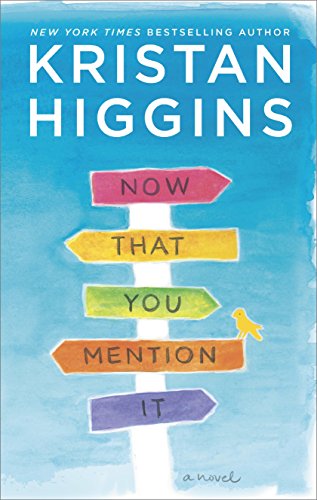
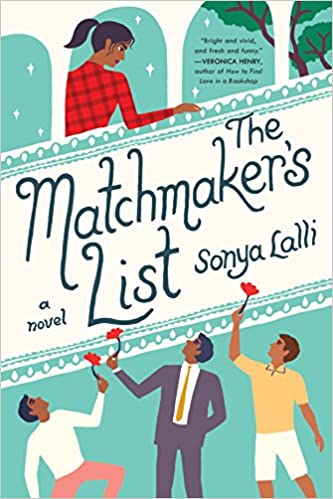 The premise of this book is simple: Raina, a half-Indian 29-year-old Canadian, has promised her (Indian) grandmother, who raised her, that she will agree to be set up on dates if she isn’t married by 30. Everyone remotely familiar with Indian culture will understand that this is a typical situation for women in their late 20s. Raina’s grandmother, Nani, jumps the gun a bit and starts harassing her early, giving her a list of suitable Indian men for her to contact and even setting up a meeting herself. Raina wants to find someone on her own, but meets some of these men, leading to some pretty funny scenes. To make matters worse, Raina’s best friend is engaged to a perfect guy, and she doesn’t seem to understand Raina’s situation.
The premise of this book is simple: Raina, a half-Indian 29-year-old Canadian, has promised her (Indian) grandmother, who raised her, that she will agree to be set up on dates if she isn’t married by 30. Everyone remotely familiar with Indian culture will understand that this is a typical situation for women in their late 20s. Raina’s grandmother, Nani, jumps the gun a bit and starts harassing her early, giving her a list of suitable Indian men for her to contact and even setting up a meeting herself. Raina wants to find someone on her own, but meets some of these men, leading to some pretty funny scenes. To make matters worse, Raina’s best friend is engaged to a perfect guy, and she doesn’t seem to understand Raina’s situation.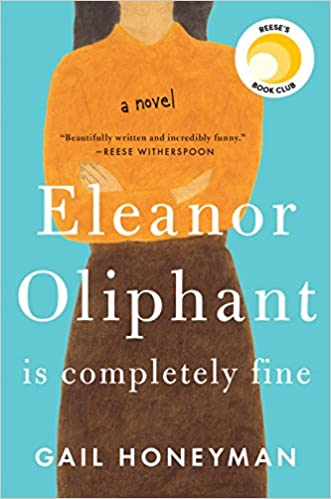 I have to say that this book isn’t the kind I normally review here, but I read it and loved it and thought I’d share. It is about a woman, so it’s in the realm of what I review, at least.
I have to say that this book isn’t the kind I normally review here, but I read it and loved it and thought I’d share. It is about a woman, so it’s in the realm of what I review, at least.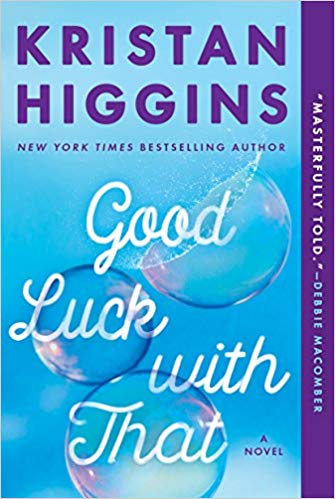 This is another of Higgins’ more recent non-romance novels. Of course, there is romance in it—two in fact—but it isn’t the focus of the book. Instead, the novel deals with how incredibly difficult it is to accept yourself and be happy when you’re a woman in America who didn’t win the gene lottery in the body size department.
This is another of Higgins’ more recent non-romance novels. Of course, there is romance in it—two in fact—but it isn’t the focus of the book. Instead, the novel deals with how incredibly difficult it is to accept yourself and be happy when you’re a woman in America who didn’t win the gene lottery in the body size department.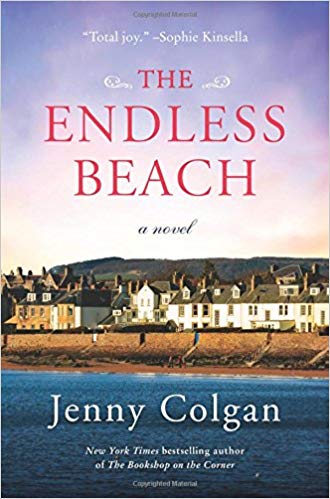 This is the the sequel to The Café by the Sea, which I reviewed here previously.
This is the the sequel to The Café by the Sea, which I reviewed here previously.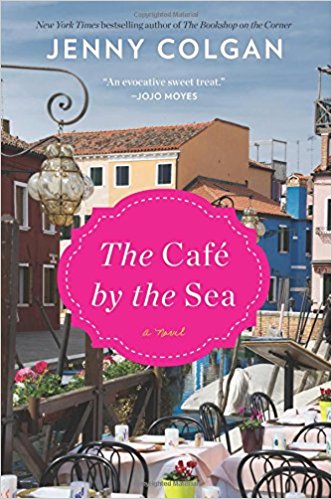 Flora is a paralegal living the life in London. She’s convinced she loves it and doesn’t regret leaving where she grew up, the (fictional) island of Mure north of Scotland. She hasn’t been back for several years after leaving under a dark cloud of some sort. When a very odd work assignment sends her back—still against her wishes—she’s reacquainted with her dad and brothers. We learn pretty quick that her mom died earlier and it was after her funeral when Flora had left.
Flora is a paralegal living the life in London. She’s convinced she loves it and doesn’t regret leaving where she grew up, the (fictional) island of Mure north of Scotland. She hasn’t been back for several years after leaving under a dark cloud of some sort. When a very odd work assignment sends her back—still against her wishes—she’s reacquainted with her dad and brothers. We learn pretty quick that her mom died earlier and it was after her funeral when Flora had left.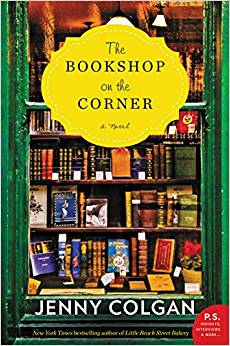 The Bookshop on the Corner is lovely, even if the name doesn’t quite fit. The main character’s bookshop is too unique to be that simplistically summed up.
The Bookshop on the Corner is lovely, even if the name doesn’t quite fit. The main character’s bookshop is too unique to be that simplistically summed up.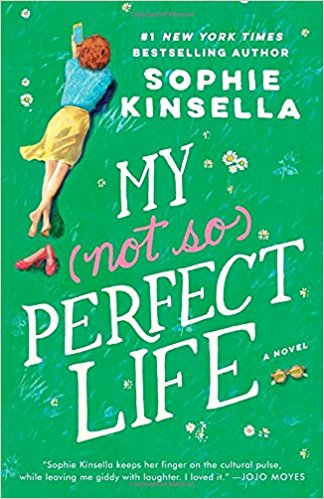 Who doesn’t love a story set in modern-day, crazy London?
Who doesn’t love a story set in modern-day, crazy London? On Second Thought is the first of Higgins’ non-romance* books that I’ve read. And I’m happy to report I loved it. There is romance in the book—two, in fact—but the main storyline is two grown sisters getting close to each other for the first time.
On Second Thought is the first of Higgins’ non-romance* books that I’ve read. And I’m happy to report I loved it. There is romance in the book—two, in fact—but the main storyline is two grown sisters getting close to each other for the first time.